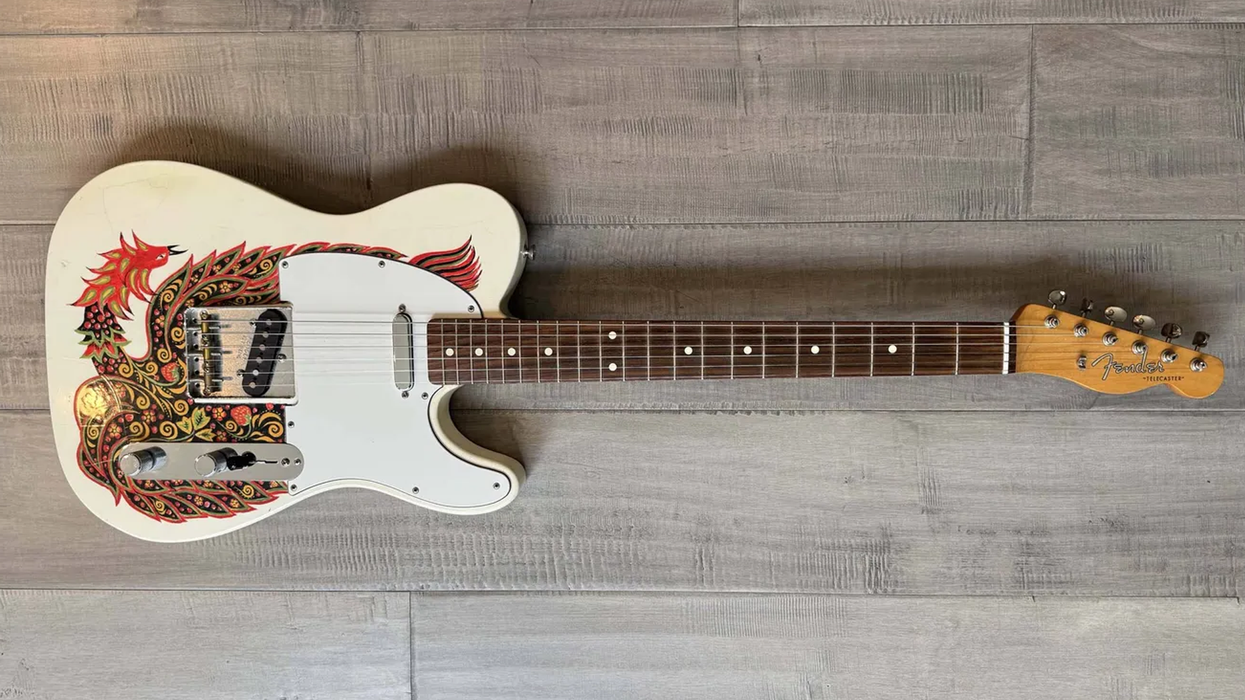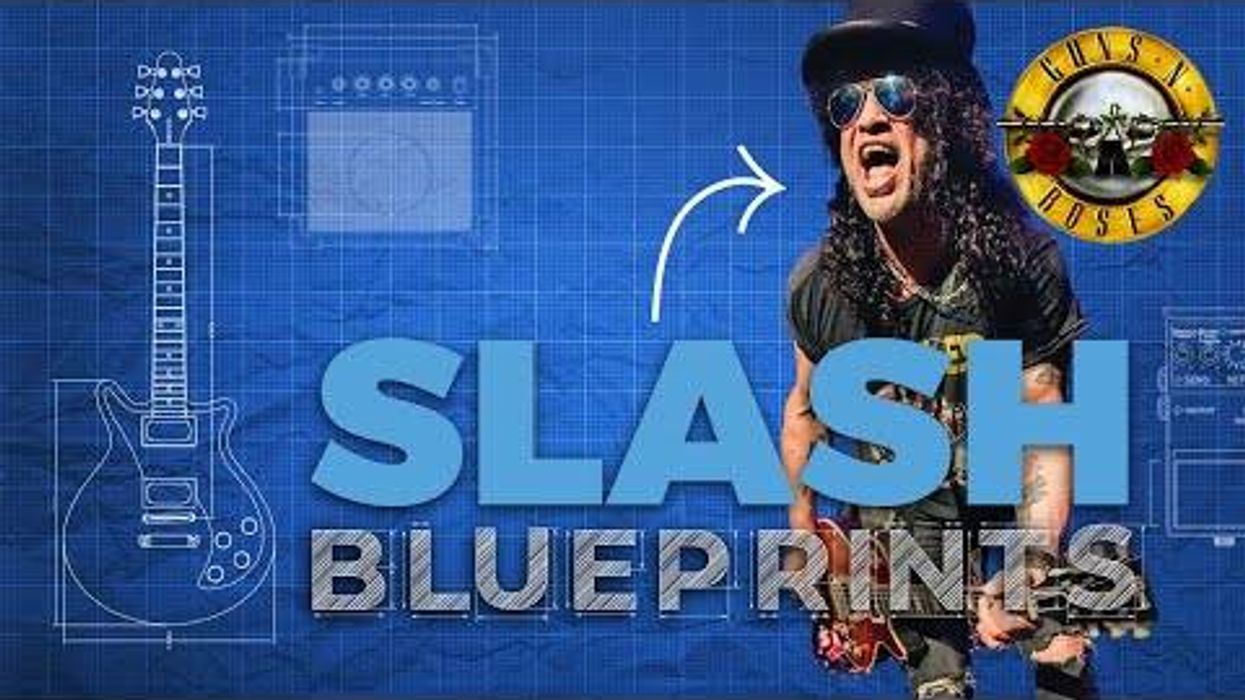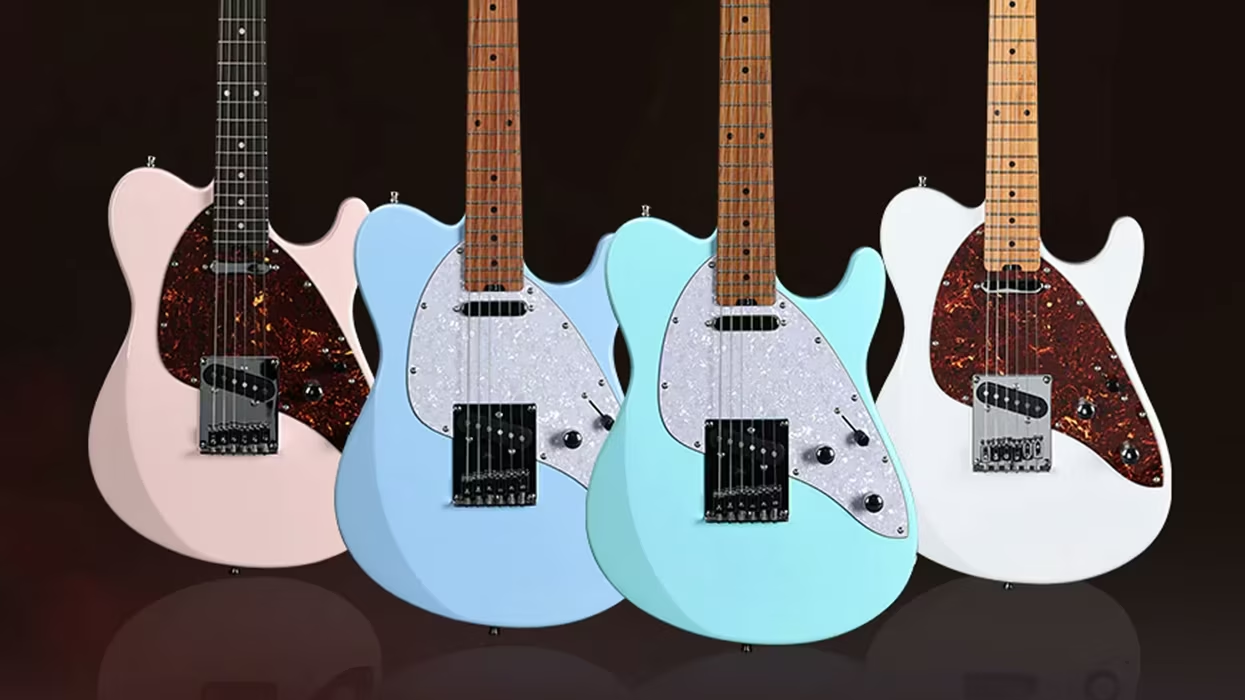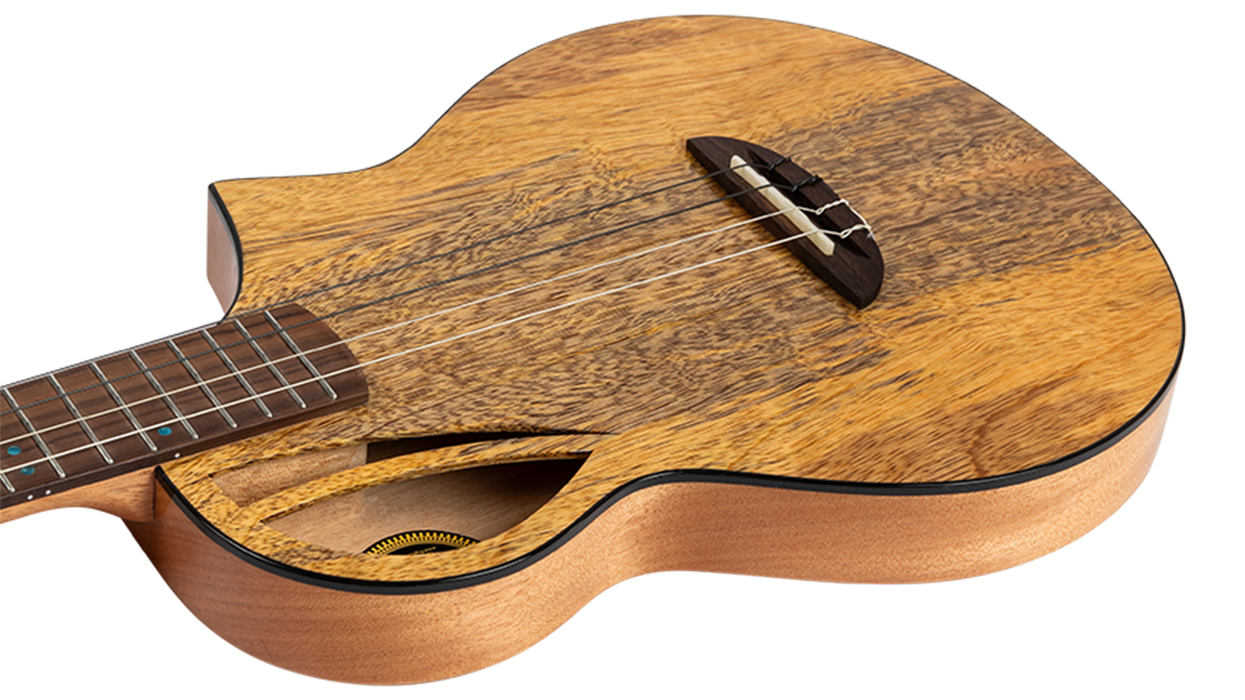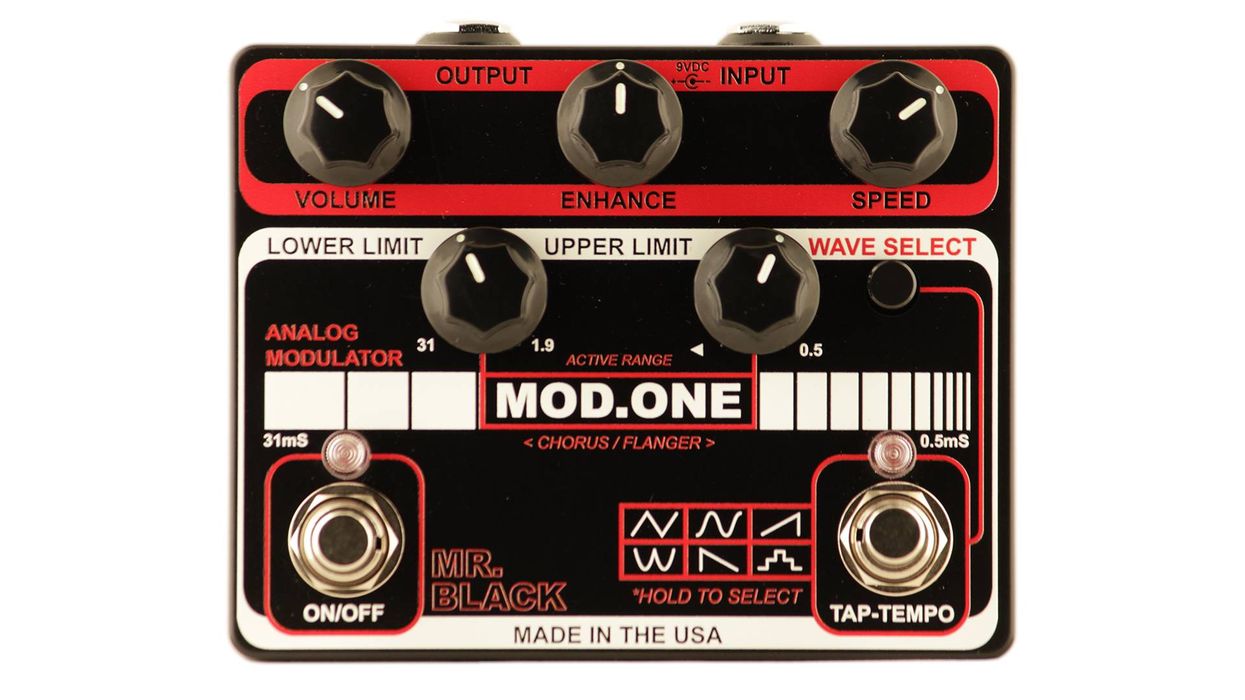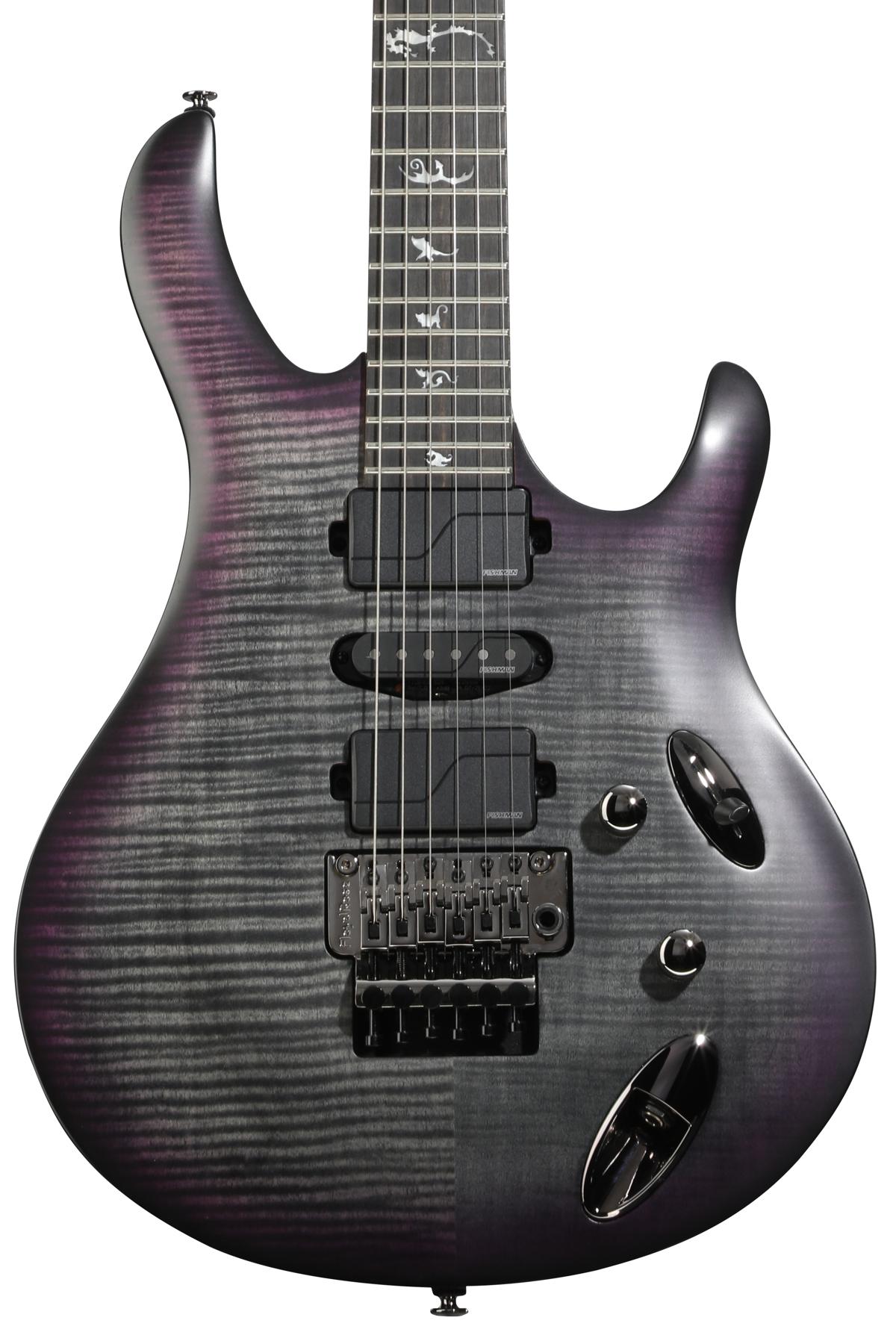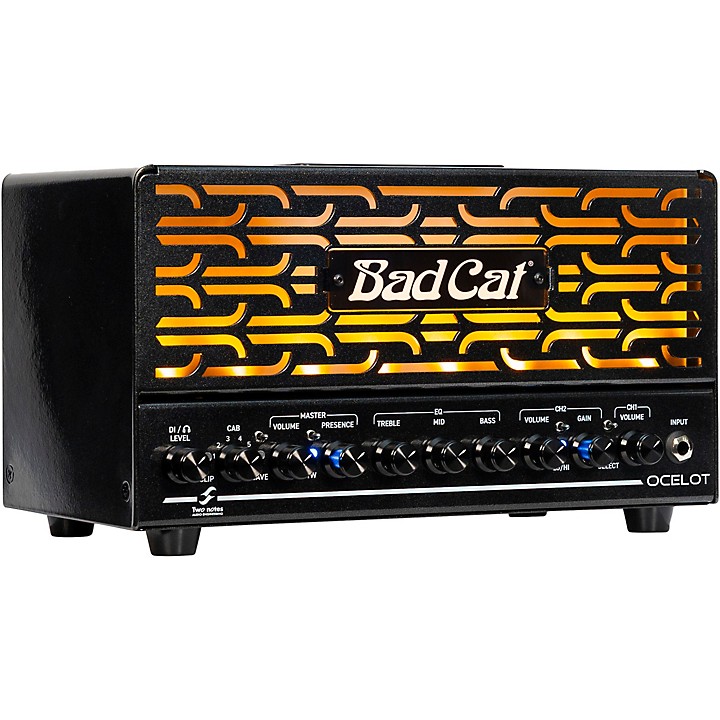Clip 2 — Plugged into a Carr The Vincent combo with bass/mids/treble at noon, reverb 0; DigiTech HardWire DL-8 Delay/Looper for slapback; bridge pickup; tone and volume pots on 10.
These days, you don’t need a Ray Butts EchoSonic amp to get the cool slapback guitar sound on so many early rockabilly singles. All it takes is a decent delay pedal and some patience. But to really do it right, you need a guitar with clarity and punch that stays sharp and defined when an amp is breaking up. A little attitude derived from a visual likeness to Scotty Moore’s Gibson ES-295 helps too.
That last part is vitally important in a genre where D.A.s, pleated skirts, pegged pants, and rolled t-shirt sleeves are still requirements. And in the form of the NYS Deluxe MC Canadian guitar builder Prestige has unveiled a flashy instrument designed specifically for rockabilly but with enough power and versatility to rip on any stage and in any genre.
Silver Streak
The Vancouver-based company’s NYS Deluxe MC is a wickedly hip machine. It’s the bigger-bodied, semi-hollow offspring of their NYS Standard, which is a midrange-focused P-90 model that splits the sonic difference between jazz and rock tones. The NYS Deluxe delivers more of the same, with a rich range of P-90 sounds from traditional to high-intensity growl when you play it through a Marshall Super Lead.
The NYS Deluxe is a good-looking guitar. Our test instrument came in an eye-grabbing, sparkling silver finish Prestige calls metallic charcoal (The other color option is—shades of Scotty!—metallic gold.). The guitar’s shiny skin alone drew plenty of love from the audience during a live performance. Other visual appointments are equally hip. The hourglass-shaped headstock has a fleur-de-lis inlay. Binding rims the headstock and flows down along both sides of the C-profile, 20-fret, solid-mahogany neck, which is also capped with a rosewood fretboard and rectangular mother of pearl and abalone inlays. There’s a single-horn cutaway for full fretboard access, two bound f-holes, and a Bigsby B7 vibrato that’s paired with a TonePros Tune-o-matic roller saddle. For the record: the TUSQ XL nut is 1 11/16” across and the neck scale length, at 24 ¾”, is nearly an inch shorter than the 25 ½” Musician Standard.
It’s a big guitar too, weighing in at a little over 9 pounds. The body is two inches deep—thinner than the Gibson ES-295 and ES-175 models that were clearly inspiration—and 15 ½” across at the lower bout. The carved maple front and back are comfortably contoured and nicely crafted, too.
Hot-N-Ready
The NYS Deluxe MC arrived in a standard case, as all high-quality guitars should, but it was not quite ready to rock. The action was a bit high for me, so I lowered the bridge, which was easily accomplished with one full rotation on each side by of the bridge with a screwdriver. The only other hitch was attaching my leather strap to the butt-end strap pin. The wraparound hardware of the Bigsby tailpiece constricts the space around the pin and doesn’t leave room for a more substantial strap. A longer-stemmed pin at the butt would be better.
Ratings
Pros:
Variety of really good vintage tones. Fast neck. Whammy stays in tune. Sex appeal.
Cons:
More feedback-prone than thinner semi-hollows. Needs a longer rear strap button.
Tones:
Playability:
Build/Design:
Value:
Street:
$1,760
Prestige NYS Deluxe MC
prestigeguitars.com
After that it was smooth sonic surfing. The NYS Deluxe MC is fun to play. It’s big but comfortable. The Gibson-like control set is smooth and easy to reach, and the vibrato feels comfortably in reach. Like any Bigsby, it’s not the stuff dive-bombs are made of, but adds tasty pitch shivers and is very tuning stable—even under hot stage lights.
Out on a gig, I blasted the NYS Deluxe MC through a stereo rig with a 50-watt Marshall Super Lead on one side and an Orange Micro Terror on the other. I also tuned the guitar to open G, so I was able to sustain a chord with a slide, step toward the Marshall, and ride the resulting feedback with the Bigsby. Clearly, this was not a rockabilly gig, but again, the NYS Deluxe MC is no purist.
The Howling
Although there’s a big block of maple in the middle of the body to combat feedback, the guitar is more feedback sensitive than my ES-345 or my wider, hollow ES-150. I chalked this up to the wider body. But the trade-off is that the NYS Deluxe MC has a unique voice somewhere between a hollow and semi-hollow Gibson, that’s further shaped by the potent pickups.
The Seymour Duncan SP90-1 soapbar pickups are a recreation of the original 1946 Gibson P-90s, and I really got to enjoy their versatility at home, plugged into a Carr Vincent 1 x 12 combo. Sans overdrive, it was near impossible to get a sound that wasn’t pleasing and warm—even on the bridge pickup with the treble rolled all the way up. And with the Carr’s carefully tailored overdrive, I very easily dialed up Clapton’s Cream tones using the neck pickup—an impressive feat for P-90s. In fact, each pickup and the combined voice of both exhibited great focus, creating leeway to explore just about any style or approach. Although if I was a jazz player, I'd put the 3-way switch into the middle position, turn both tone pots down to about 5 or 6, and let the warm butter flow.
The Verdict
Prestige’s NYS Deluxe MC was a joy to play at home and onstage—where it drew raves from audience members for its beauty and brutish overdriven tones. It’s not only easy on the eye, it feels smooth under the fingers with its fast, C-profile neck, medium-jumbo frets, and easy-to-wiggle Bigsby. Then there’s the tones: The wide, clearly ringing array of classic sounds for all seasons makes the NYS Deluxe MC much more than a rockabilly playmate. And with this street price, it’s actually quite a deal—especially in comparison to many ES-295 copies and reissues on the market.
Watch the Review Demo:








![Rig Rundown: Russian Circles’ Mike Sullivan [2025]](https://www.premierguitar.com/media-library/youtube.jpg?id=62303631&width=1245&height=700&quality=70&coordinates=0%2C0%2C0%2C0)







